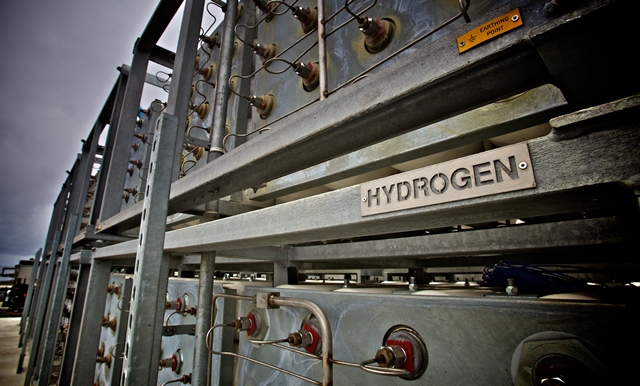
EMEC hydrogen storage cylinders (Photo: Colin Keldie)
EMEC awarded funding for four feasibility projects supporting green hydrogen innovation and development.
The award comes as part of the Scottish Government’s Hydrogen Innovation Scheme through which 32 projects across Scotland are set to receive funding of £7 million to drive innovation in the production, storage and distribution of renewable hydrogen.
Launched in June 2022, the Hydrogen Innovation Scheme is a capital funding stream of the Emerging Energy Technologies Fund, designed to support the development and demonstration of renewable hydrogen technologies and products needed to support the Scottish Government’s ambition of 5GW installed hydrogen production capacity by 2030.
First Minister Humza Yousaf announced the Hydrogen Innovation Scheme funding while addressing delegates at the All-Energy conference last week in Glasgow.
The First Minister said:
“We have committed £100 million, over this parliamentary session, to supporting the green hydrogen sector.
“Part of that funding has been allocated to the Hydrogen Innovation Scheme, which supports feasibility studies, technical demonstrations and testing facilities for new ideas about how to produce, store and distribute hydrogen.
“The projects cover a wide range of different areas – such as how to produce and store hydrogen on floating windfarms, and how to decarbonise agriculture and forestry work in rural areas. Together, they show the range of possible ways in which hydrogen can be produced, used and stored. They highlight the expertise and innovation that is already such an important part of the sector. And, of course, they demonstrate the scale of the opportunities that hydrogen can create.”
EMEC is part of four project consortia which have won funding totalling over £500,000 to conduct feasibility studies supporting the development of novel hydrogen production, storage and distribution solutions.
The projects will explore various technology concepts which support offshore and off-grid hydrogen production, sea water electrolysis and an artificial intelligence model to support hydrogen logistics. They include:
- HySKUA (Lead partner: EMEC). A study that will focus on offshore production of green hydrogen on a floating hydrogen production hub with the potential to be co-located with Scottish offshore windfarms.
- HyBrine (Lead partner: sHYp BV Ltd). Feasibility study for project HyBrine, which aims to achieve low cost, efficient, and sustainable hydrogen production by using seawater as the water source and through technology advancements that avoid the need for desalination systems and enable more durable, reliable electrolysis.
- Feasibility of Explainable AI to support decision making as applied to hydrogen generation (Lead partner: Intelligent Plant Ltd). Study to develop a decision support system and use explainable artificial intelligence to support operational efficiency and logistics solutions for hydrogen production.
- Off-grid Green Hydrogen Production Demonstration (Lead partner: ORE Catapult Development Services Limited). Study to assess the feasibility of an off-grid green hydrogen production demonstration project.
Matthew Storey, EMEC’s Hydrogen Development Manager, said:
“This funding signals a clear willingness from Scottish Government to integrate green hydrogen into our future energy system.
“Using our experience in applied hydrogen R&D, sustainable fuels and techno economics, EMEC will be delivering this work in partnership with skilled teams across the project consortia and are delighted to be leading HySKUA.
“The four projects cover key areas which require further research and development if we are to realise hydrogen’s potential in the energy mix and will help to identify issues in supporting the scale up of these hydrogen technologies.”
 KEYFACT Energy
KEYFACT Energy